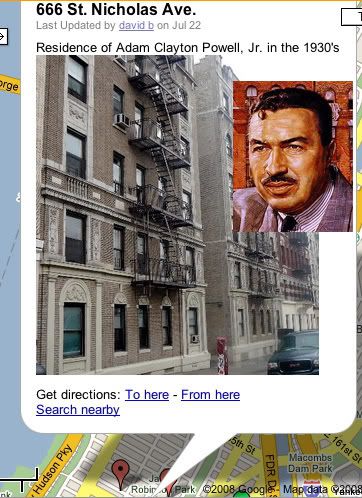 here's a link to my google map on harlem where the image below comes from.
here's a link to my google map on harlem where the image below comes from.
from wikipedia
Rev. Adam Clayton Powell, Jr. (November 29, 1908 – April 4, 1972), American politician, was the first[citation needed] African American to become a powerful figure in the United States Congress. He was elected to the United States House of Representatives from Harlem in 1945, and he became chair of the Education and Labor Committee in 1961. His tenure as committee chairman saw the passage of important social legislation.
Powell was born in New Haven, Connecticut. His father, Adam Clayton Powell, Sr. was a Baptist minister and headed the Abyssinian Baptist Church in Harlem, New York. His paternal grandfather was white, as were several of his mother's ancestors. He was educated at public schools, the City College of New York and Colgate University. He received an MA degree in religious education from Columbia University in 1931.
During the Depression years, Powell, a handsome and charismatic figure, became a prominent civil rights leader in the Harlem area of Manhattan and developed a formidable public following in Harlem community through his crusades for jobs and housing. As chairman of the Coordinating Committee for Employment, he organized mass meetings, rent strikes and public campaigns, forcing companies and utilities, and the Harlem hospital to hire black workers. Powell organized a picket line and the 1939 New York World's Fair at the Fair's executive offices in the Empire State Building; as a result, the number of black employees was increased from about 200 to 732 [1]. A bus boycott in 1940 led to the hiring of 200 black workers by the transit authority. When Negro pharmacists were failing to get hired, Powell led a fight in 1941 to have drugstores in Harlem hire them all.
In 1937 he succeeded his father as pastor of Abyssinian Baptist Church. In 1941 he was elected to the New York City Council as the city's first Black council representative with the aid of New York City's use of the Single Transferable Vote. He received 65,736 votes, the third best total among the six successful council candidates
"Mass action is the most powerful force on earth," Mr. Powell once said, adding, "As long as it is within the law, it's not wrong; if the law is wrong, change the law." According to analysts, he landed in Washington as Congressman armed with a mandate from the grassroots to make a difference.
In 1944 Powell was elected as a Democrat to the House of Representatives, representing the 22nd congressional district, which included Harlem. He was the first black Congressman from New York, and the first from any Northern state other than Illinois.
As one of only two black Congressmen, Powell challenged the informal ban on black representatives using Capitol facilities reserved for members only. He took black constituents to dine with him in the "whites only" House restaurant. He clashed with the many segregationists in his own party.
In 1956 Powell broke party ranks and supported Dwight D. Eisenhower for reelection, saying that the Democratic platform's civil rights plank was too weak.
In 1958 he survived a determined effort by the Tammany Hall machine to oust him in the Democratic primary election.
In 1960, Powell forced Bayard Rustin to resign from the Southern Christian Leadership Conference (SCLC) by threatening to discuss Rustin's homosexuality charge in Congress.
In 1961, after 15 years in Congress, Powell became chairman of the powerful Education and Labor Committee. In this position he presided over federal programs for minimum wage increases, education and training for the deaf, vocational training and standards for wages and work hours, as well as aid to elementary and secondary education. He orchestrated passage of the backbone of President John Kennedy's "New Freedom" legislation. He would also become instrumental in the passage of President Lyndon B. Johnson's "Great Society" social programs.
Powell Jr.'s committee passed a record number of bills for a single session. That record still remains unbroken. As one of the great modern legislators, Powell Jr. would steer some 50 bills through Congress.
He passed legislation that made lynching a federal crime and bills that desegregated public schools and the U.S. military. He challenged the Southern practice of charging Blacks a poll tax to vote, and stopped racist congressmen from saying the word "nigger" in sessions of Congress.
By the mid-1960s Powell was being increasingly criticized for mismanagement of the committee budget, taking trips abroad at public expense, including travel to his retreat on the Bahamian isle of Bimini, and missing sittings of his committee. He was also under fire in his district, where his refusal to pay a slander judgment made him subject to arrest. He spent increasing amounts of time in Florida and displayed his wealth more than was wise for a Congressman representing a poor district.
In January 1967, following allegations that Powell had misappropriated Committee funds for his personal use and other corruption allegations, the House Democratic Caucus stripped Powell of his committee chairmanship. The full House refused to seat him until completion of an investigation by the Judiciary Committee. In March the House voted 307 to 116 to exclude him. Powell won the special election in April to fill the vacancy caused by his exclusion, but did not take his seat.
Powell sued in Powell v. McCormack to retain his seat. In June 1969 the Supreme Court ruled that the House had acted unconstitutionally when it excluded Powell, a duly elected member, and he returned to the House, but without his seniority. Again his absenteeism was increasingly noted.
In June 1970 he was defeated in the Democratic primary by Charles B. Rangel, who has represented the area ever since. Powell failed to get on the ballot for the November election as an independent. He resigned as minister at the Abyssinian Baptist Church and moved to Bimini.

















0 Comments:
Post a Comment